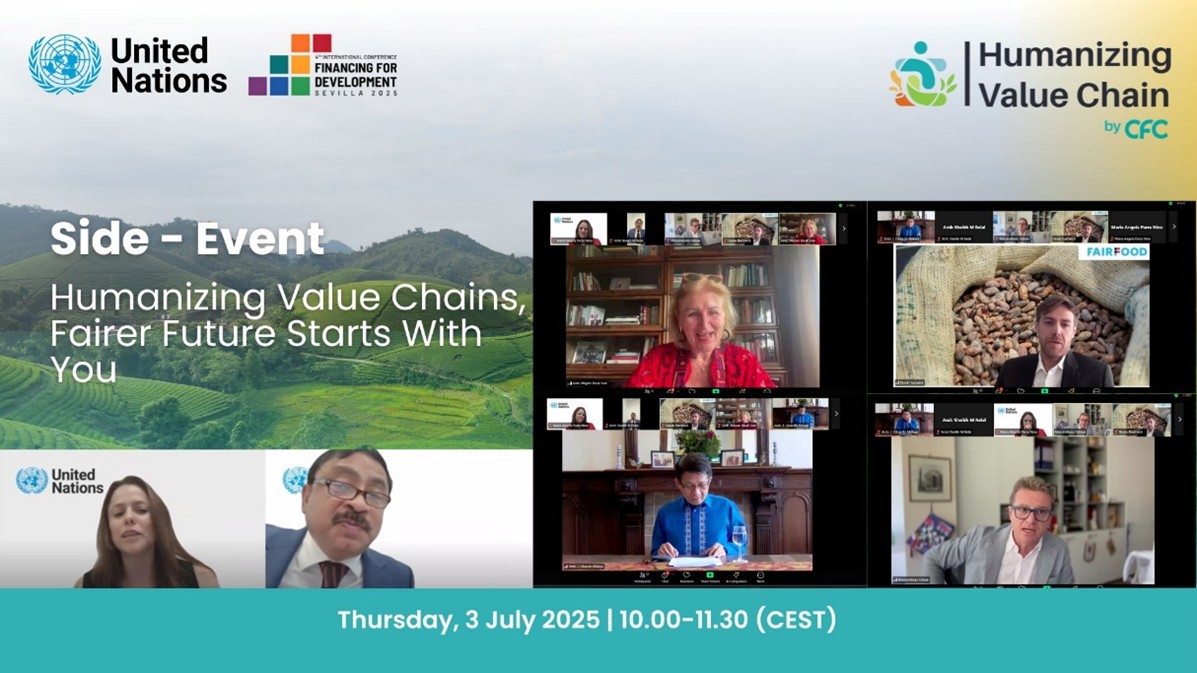Humanizing Value Chains: Global Leaders Call for Justice, Transparency, and Living Wages in Trade
Seville, Spain – 3 July 2025 – At a pivotal side event titled “Humanizing Value Chains”, held during the Financing for Sustainable Development conference, leaders from global institutions called for a trade transformation that embeds fairness, transparency, and dignity into every transaction—starting with the smallholder farmers and workers too often left behind.
Moderated by Dr. Mariangela Parra – Lancourt, Chief of the Strategic Engagement and Policy Integration Branch at the Financing for Sustainable Development Office at the United Nations Department of Economic and Social Affairs, the session placed a spotlight on the systemic inequalities faced by producers in the Global South, and how digital tools can now rewrite that narrative.
In his keynote address, Ambassador Sheikh Mohammed Belal, Managing Director of the Common Fund for Commodities (CFC), unveiled the Foundation’s innovative model for humanizing value chains:
- Blockchain to trace value and expose pricing inequities
- AI to verify living wage gaps in real time
- Micro-repatriation tools that allow consumers to directly contribute to the incomes of producers — not as charity, but as a right
"Behind every product is a story. Let’s rewrite it—with fairness, transparency, and your choice," said Ambassador Belal. He highlighted the staggering power of collective action: just one cent per cup of coffee could lift 25 million smallholder farmers worldwide above the poverty line.
Speaker Highlights:
The “Humanizing Value Chains” event brought together diverse global leaders and practitioners united by one vision: to restore dignity to the people behind the products we consume. Each speaker added a powerful voice to the growing call for transparency, justice, and inclusion in global trade.
- H.E. Mirjam Blaak Sow
Ambassador of Uganda to the Benelux & Chair of the CFC Governing Council
Ambassador Blaak Sow passionately highlighted the real-world impact of CFC-backed projects in Uganda, such as Just Know Your Coffee (JKCC) and rural energy initiatives. She spoke not as a diplomat, but “as a fellow human being,” underscoring how placing tools directly in the hands of farmers has transformed livelihoods and expanded market access. Her remarks were a rallying call to scale proven solutions and treat value chain equity as a global imperative.
- H.E. Eduardo Malaya
Ambassador of the Philippines to the Netherlands & Chair of the CFC Executive Board
Ambassador Malaya showcased how humanizing value chains isn’t theoretical—it’s already underway in the Philippines. He shared the example of Kennemer Foods International, a CFC partner transforming cocoa farming in Mindanao into a climate-resilient, inclusive sector empowering over 15,000 smallholders. His intervention reinforced the message that catalytic financing and community-centred investment models are key to sustainable transformation.
- Massimiliano Fabian
CEO and President, Demus Coffee S.p.A
Mr. Fabian brought the essential private sector perspective to the conversation. As head of a leading coffee brand and industry federation, he highlighted the growing consumer demand for ethical sourcing and verified impact. Fabian expressed a strong interest in embedding blockchain and humanized practices into corporate supply chains, recognizing that today's customers—especially younger generations—are demanding more than a product; they want proof of purpose. He positioned coffee as a frontline sector for piloting value chain transformation.
- Derek Hardwick
Digital Manager Solutions, Fairfood
Representing Fairfood, Hardwick showcased how blockchain, digital tipping, and traceability tools can drive systemic fairness in agricultural value chains. He emphasized the shift from charity-based models to rights-based, technology-powered frameworks that connect consumers and smallholder producers directly, ensuring fairness and dignity throughout the supply chain.
All the speakers underscored a common message: the time for incremental CSR is over. The future lies in verified, justice-driven trade, powered by consumer choice and digital transparency.
The event concluded with a bold call to action: It is time to embrace blockchain-powered micro-repatriation systems as a transformative tool in global trade. By leveraging transparent, traceable technology, we can ensure that a greater share of value from everyday purchases flows directly back to the smallholder farmers, producers, and workers who sustain global supply chains.
This is more than a technological upgrade—it is a structural shift toward economic justice. Every transaction becomes an opportunity to redress inequality, empower communities at the source, and build more resilient local economies. The message was clear: we must reimagine consumption as a force for good, where each purchase is not just a financial exchange, but a deliberate act of empowerment and solidarity.
For media inquiries, please contact:
[CFC Media Relations Team]
[Email: managing.director@common-fund.org]
[Phone: +31 20 575 4949]

